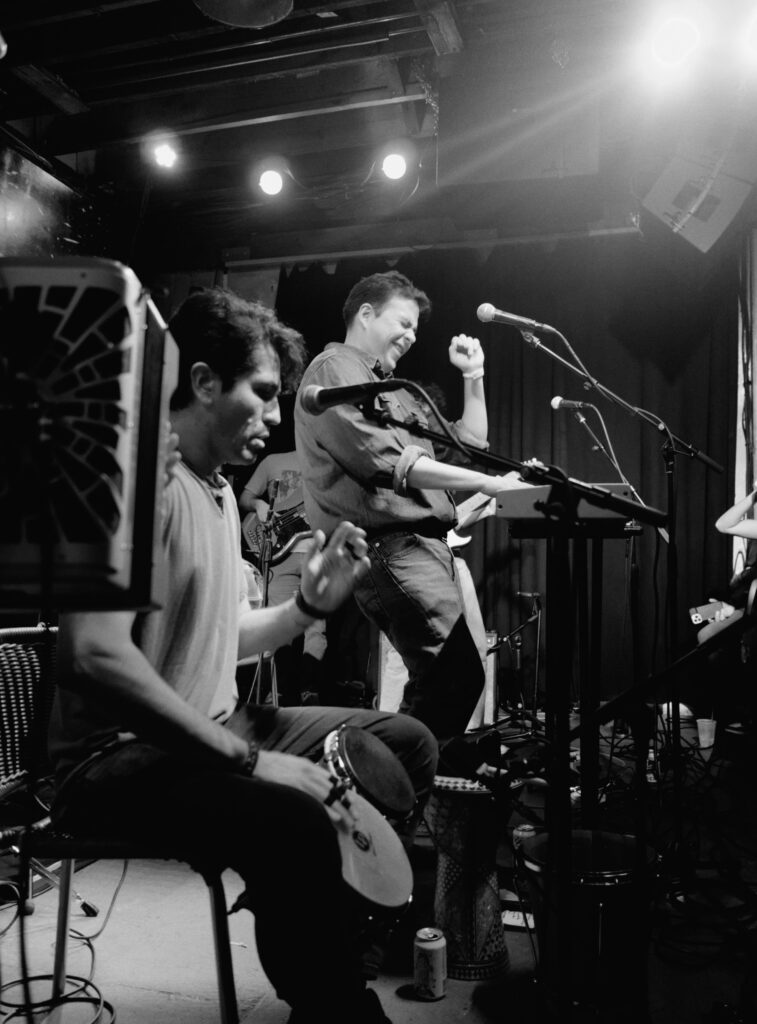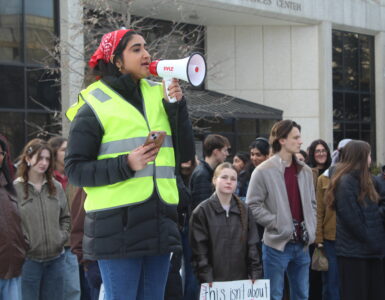
In a district historically known for its go-go and punk music scene, Cumbia Heights – a riff off on the neighborhood Columbia Heights, hopes to make room for Latin artists in D.C.
The roughly 10-person ensemble of Cumbia Heights pays homage to one of Washington’s largest Hispanic communities, Columbia Heights, a place where many of the band members once lived. Through guitars, drums, accordions and trumpets from musicians who hail from Colombia, Texas, Mexico and Peru, Cumbia music has a new home and audience in the Capital.
Around five years ago, at Eighteenth Street Lounge, a townhouse music hub in Mount Vernon Square, Fernando Hernandez and Tomas Monarrez regularly attended the neighborhood’s entertainment space for Latin music and dancing. It was like a party, but they wanted to continue the vibe independently in D.C. since the lounge didn’t have Cumbia, they saw an opportunity.
“After just jamming up for a while, we were like, ‘We should start a Cumbia [band],’” Fernandez said. The rest was history; one after one, Gonzalez would continue to bring musicians into their startup band, and then, in January 2019, a DIY music group called Cumbia Heights was born.
Cumbia, which originated in Colombia in the late 19th century, is a genre of Latin American music composed of rhythmic beats and light singing. While the band has sparked many fans, Hernandez said Cumbia music has lacked throughout the district.
The band has bounced around small bookings in Mount Pleasant and Columbia Heights. From playing original songs like “Poder del Pueblo” or remixing classic hits like “Careless Whisper,” Cumbia Heights has expanded to new listeners in larger venues, one of which will be in New York on Nov. 16.
If you asked Hernandez if he saw Cumbia Heights taking off like it has these past four years, he would’ve laughed and said no. From small performances at private events to a crowd of nearly hundreds in September, Hernandez realized they had created something larger than they imagined.

That Cumbia feeling
Charles and Claudia Lawrence of Leon City Sounds, said Cumbia Heights feels like a celebration of Hispanic heritage and hope for the future of Latin music for both artists and listeners.
Charles and Claudia, who have been DJing around DC clubs for over ten years, said the band is doing more than reaching the Latino community. It’s begun to create a community of individuals supporting small artists who haven’t had the opportunity to perform.
“What’s important with what we’re doing and what Cumbia Heights is doing is [that] we’re trying to build a bridge not only interculturally with people from other cultures but also among different generations,” Claudia said. She also said that the Cumbia band is something new for the city and continues to expand outside the district.
Early fans like Yulia Quinones, a television reporter for Telemundo, said she was surprised to see such a following beyond Latino residents. It was refreshing for her to witness, as someone who had moved from the Dominican Republic to D.C.
“I saw that it was one of the most diverse crowds I had seen and I thought it was really interesting that they were bringing Cumbia to D.C. because Cumbia hasn’t really had a space in D.C.,” Quinones said. She also said that seeing the band’s live presence helps add to the growing scene of bringing Latin music to the district.
Cumbia is a music shared throughout the Americas and a way to engage with one’s culture through music, Zaira Gonzalez, who plays the trumpet for the band, said. And to preserve Hispanic heritage and culture, it starts with something as small as music.
“We’ve had [the] chance to bring people together and see a place and [create] a place for people to meet and build community,” said.
Preserving Columbia Heights’ Latin culture

Hernandez said Cumbia Heights’ current mission is trying to keep the music scene alive in Mount Pleasant and Columbia Heights. He hopes that by continuing to perform they can preserve Latin culture in D.C. for future generations of listeners and performers.
“They’re named after a neighborhood in Washington, D.C., that’s predominantly where people from Latin America immigrated to, and that history goes back generations and they might be the only one right now flying that flag for Washington D.C., which is important to keep those neighborhoods like Columbia Heights and Mount Pleasant and the whole 16th street [relevant],” Charles said, adding that without Cumbia Heights there would no representation for the music genre and the neighborhood.
While the band hopes to draw in more fans and go on long tours across the states, for now, their focus will be on creating a space for more Latin artists to perform and embracing Latin history and culture through their music.
“That’s the beauty of art … when you are exposed to an artist or to music it’s not only [about] what you’re listening to or the dance to it, but it’s also the history that is behind that [music],” Claudia said















Those are my photos, I’d appreciate a credit please.
Hi Matt! Incredible photos. Thank you so much! I spoke to the reporter, Lillian, and she said she made an update to give you credit. If you have any issues, please let me know. Chris Halsne Co-Editor halsne@american.edu
This is a wonderful story. Mil gracias.
We are salseros here in California near Sacramento. Please come play here.
We like to mambo, Cha Cha and RUMBA!!